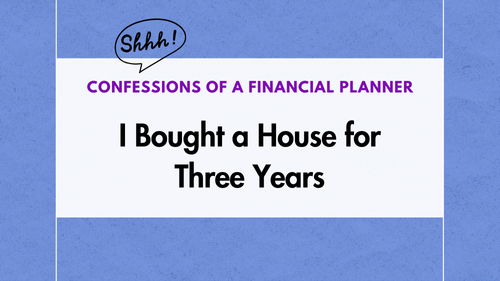Last Updated on April 14, 2025
This is the fourth article in the “Confessions of a Financial Planner” series about how I bought a house for three years.
You can read the others here:
- Confessions of a Financial Planner: I’ve Held “Too Much” Cash
- Confessions of a Financial Planner: I Felt Guilty About An Inheritance
- Confessions of a Financial Planner: I Took Two Years to Update My Estate Plan After Getting Married
If you’ve heard the rule of thumb, you usually want to only buy a house if you intend to live there for five to seven years.
Will this turn out to be a wise financial decision?
Probably not, and I knew that going into the choice, but from a personal finance perspective, it’s been a good life choice.
I didn’t choose to buy a house for three years because it was a good economic decision. I made the choice because it would be a good personal decision for our lifestyle.
Let’s dive into why I bought a house for three years, the surprises we ran into buying a house, whether I regret buying it, and when you should consider buying a house.
The Confession of a Financial Planner: I Bought a House for Three Years
My confession is that I bought a house with the intention of selling it in three years.
I meet up a few times a year with other financial planners in my local area, and you should have seen their faces when I asked, “Should I buy a house for three years?”
They were nice enough to waiver back and forth, though most suggested not doing it. I don’t blame them. It would be my blanket advice if I didn’t know anything about someone’s situation. Three years is a very short time frame.
It’s a short time frame because there are buying costs, repairs, maintenance, selling costs, and the uncertainty of how real estate will go up and down in value. I’ll talk about that more in later sections of this article.
Reasons/Excuses of Why I Bought a House for Three Years
My wife and I were originally planning to be in Madison for three years during her Internal Medicine residency. We secured an apartment over Zoom, without ever visiting the city or seeing the exact apartment we would be in. To put it in context, this was in early 2021 during the pandemic.
We got a feel for where we would be living by dropping the little person on Google Maps into the road and navigating around. We didn’t end up seeing our apartment building in person until April 2021 when we visited the city for the first time.
As someone who likes to carefully make a plan and come up with a plan B and C, this was a scary time.
Our apartment was okay for me and ideal for my wife. It was walking distance to the hospital for her, which was a big plus. For me, I could make it work for three years.
My wife ended up wanting to do additional training in medicine, which meant we were going to be in Madison for another three years.
I couldn’t take apartment living for another three years.
Mental Health
The main reason I wanted a bigger place was for mental health reasons. Kindness Financial Planning is a virtual business and I work from home. This meant I worked and lived from our apartment nearly 24/7.
I could have paid for a business space as my business started doing better, but I didn’t want a separate space to furnish, commute, or deal with two leases.
When you are in an apartment all day without a change of scenery, life feels small. I was feeling less happy in the space.
Escape the Trains
Another huge reason that intertwines with mental health are the trains. When we rented the apartment, we had no idea they were a parking lot away from a train track with no vegetation in between.
Worse, we were between two crossings where trains would blow their horn before approaching.
It was not uncommon for trains to go by multiple times per day, including during the night. I frequently woke up to the horn and was startled by them during the day.
I know some people say they get used to trains, but I’m not one of them. Our building would shake a bit when trains went by, and I could feel my blood pressure rising every time I heard a train horn.
Finding a Rental was Difficult
We knew we didn’t want to be in another apartment, so we started looking for rental houses. I spent time trying to rent a house, but supply is limited in Madison, and I became fed up with the process quickly.
The first house I went to go see, the leasing agent showed me the place, and I asked about putting in an application. She told me they already had one and were likely going to accept it. I was thinking, “Why did I drop everything I was doing to drive across town to see a place that is already rented?” This place had been on the market for a day, and I drove over as soon as I could to see it.
The second house had about 10 people show up to the public showing, and we got our application in within two hours of receiving it. We were chosen for this house, but then they changed the leasing terms from what we originally discussed. After questions and extensive back and forth, we both decided to go our separate ways. What they did was shady, and we wouldn’t trust them.
At this point, I didn’t want to be one of ten applications hoping we might get selected for any house we saw. I also had concerns about property management. Many of the property managers have bad reviews, and finding a small landlord who is managing their own property is rare.
Get Away from Inconsiderate Neighbors
When we moved into our apartment, it was a lovely building. People were respectful.
By the time we moved out, animals were urinating in the hallway, people were allowing their pets to defecate in the stairwell and not picking up after them (and pets weren’t even allowed!), and people would leave carts meant for groceries in their apartment for hours or in hard-to-find locations.
I can be a patient person in many aspects of life, but people being inconsiderate and rude is not one of them.
Although some of these may sound like minor reasons, the combination of them and the prospect of enduring it for another three years was not something I wanted to go through.
Surprises of the House Purchase
Buying a house turned out to be a nearly impossible task. Like rentals, supply was lacking.
We saw or seriously thought about 10 to 14 different houses and made what we thought were competitive offers on 5 to 6 houses.
After getting outbid too many times, we put a risky offer in waiving inspection and many other terms that meant we had no out if we didn’t want the home. I thought I’d never put in that type of offer, but I got desperate.
We knew the house needed quite a bit of work and budgeted for most of it, but we found more than we anticipated once we closed.
New Deck
The original deck on the house was a bit uneven, but I thought it would be a simple enough fix to level it. After an investigation from our roofer, who happened to just be a really nice guy, we discovered the flashing on the deck wasn’t done properly.
This was causing other issues in the house.
Unfortunately, this meant a new patio door and deck to the tune of $20,000. I was flabbergasted at the price, but the roofer was cutting me a deal. This came in at least a few thousand cheaper than other quotes I had received for only a deck, and the handy person I had out said I got a great deal.
I’ve learned how expensive decks are in today’s world. I now look at large decks differently!
Bad DIY Jobs
As we lived in the house, we started to find what I could call bad DIY jobs from the previous owners. We found a light fixture or two that didn’t have electrical boxes. We had a few toilets that were not installed properly. Thankfully, there was no damage, but it could have been a disaster.
The house also did not have a good drainage system, so the backyard turned a bit into a swamp in heavy rains.
None of these jobs were financially disastrous, but it was annoying to keep finding contractors to fix one thing after another. It adds up!
Do I Regret Buying a House for Three Years?
If you had asked me while buying the house and seeing my bank account dwindle, I would have said yes.
Right now, the answer is no.
When we plan to sell in a couple of years, the answer could be yes. I think it depends on how much of a loss we realize when selling.
I’ve already mentally accepted that we are likely selling at a loss. I knew it would be a close call even before the cost of the new deck, and that blew up my financial models. Yes, I modeled out different price appreciation and decline scenarios to see what the total cost of the house might be over those years.
Although my wife and I don’t want to rent the house, it’s always a backup option if we would take a huge loss on the house or the real estate market is in a tough spot when we want to sell.
So far, the house has been a great change in lifestyle. It’s wonderful having more space. Friends and family can stay with us anytime and have access to their own level, which includes a bedroom, bathroom, and living area.
Our neighbors are wonderful. We’ve been invited to dinner. They say hello whenever we are outside. People welcomed us to the neighborhood. It’s probably a Midwest thing, but it’s been nice.
It’s quiet. It’s oh so quiet. There are no trains or emergency vehicles. The only noise is the occasional dog barking and kids playing.
Even if we take a huge loss on the house in a couple of years, I hope I’ll remember that our quality of life was much higher, and it’s challenging to put a price on what that is worth.
When Should You Buy a House?
It’s difficult to say when you should buy a house, but a general rule of thumb is the following:
- When you want one and
- When you can handle the expenses of a house and
- When you plan to be in it for at least 5 to 7 years or are okay potentially taking a loss on it if you need to sell sooner.
Many people jump into buying a home, sometimes for short time frames, without understanding that most of your mortgage payment goes to interest the first few years and you build very little equity. If the housing market goes down or does not appreciate much and you try to sell within the first few years, you may not be able to if you didn’t have a high enough down payment.
For example, if you bought a home for $875,000 with a $700,000 loan (20% down) for 30 years at 6%, below is how much went toward principal and interest in the first five years.
Despite paying $247,614.37 in mortgage payments, you only paid down $47,684.23 in principal, so your $700,000 loan only went down to $652,315.77.
Let’s assume your house was worth $875,000 when you bought it and the price went down 10% and it costs 8% to sell it. The new home value is worth $787,500 and the selling expenses are $63,000, meaning you will net about $724,500.
After paying off the loan of $652,315.77, you’ll receive about $72,184. Unfortunately, you put $175,000 into the down payment, which means you lost about $102,816.
Although it’s rare for housing prices to decrease, it happens, particularly in short time frames. Ignoring that it can happen can catch people off guard.
Some people underestimate the time and money required to keep a house. I’ve worked with many retirees who know how difficult it can be to take care of a house. Many start outsourcing landscaping, repairs, and other maintenance as they get older. Some continue that set up while others decide it’s not worth it and move to an apartment/condo or independent living facility where they have less to take care of.
A common guideline is to budget 1% to 3% of the current market value of the house for annual repairs and maintenance. For example, if your house is worth $1,000,000 you may want to earmark $10,000 annually for maintenance. You won’t spend $10,000 every single year, but when you factor in a new roof, siding, appliances, general upkeep, and other large expenses, it’s a decent rule. You can budget on the higher side if you have an older home that may need more repairs and on the lower side if you have a newer home or recently renovated home.
Breakeven Time Frame for Buying and Selling a Home
One of the common questions people ask is “Is it better to buy or rent?”
There are many personal choices that go into that decision, as I’ve previously talked about. I didn’t buy a house because it made financial sense. I made it because it was a lifestyle decision.
But, if you are curious about the financial side of it, The New York Times has an excellent calculator: https://www.nytimes.com/interactive/2024/upshot/buy-rent-calculator.html
You can plug in detailed assumptions about the house you’d buy versus the house you’d rent, how long you plan to stay, mortgage details, different growth rates, taxes, maintenance and closing costs, and get an estimate of how much renting or buying would be better for the time frame you selected.
In many cases, you’ll find the break even is often 5 to 7 years to buy a house, unless you buy it for a great deal or your local area experiences significant price appreciation.
Final Thoughts – My Question for You
I’m fully expecting to take a loss on selling the house in a couple of years, which is a bit painful.
At the same time, I remember how miserable I was in the apartment and how difficult it was finding a home to rent.
I wouldn’t encourage people to buy a house for three years, and even I wavered back and forth on the decision for some time. It’s a risky financial decision, and the only reason I felt comfortable taking the plunge was because even with a loss, we’d be okay financially and we are likely to be in a much better financial situation when my wife completes her medical training.
In the meantime, I’m going to enjoy the house, welcome friends and family to stay with us, and enjoy the neighborhood.
And I’ll do my best not to think about the money we’ve poured into the house.
I’ll leave you with one question to act on.
What analysis will you do before buying your next house?




